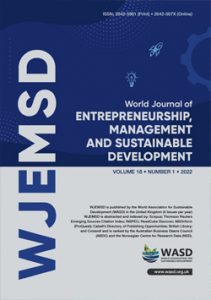Corruption and firm-level productivity: greasing or sanding effect?, Edward Bbaale and Ibrahim Okumu
 Edward Bbaale, Ibrahim Mike Okumu
Edward Bbaale, Ibrahim Mike Okumu
School of Economics
Makerere University, Kampala
Uganda
Email: eddybbaale@gmail.com
DOI: 10.1108/WJEMSD-10-2017-0067
Purpose: Corruption was ranked among the top five biggest obstacles affecting the operation of enterprises in Africa and was rated as a severe obstacle by close to 40 percent of firms in the sample. Consequently, the purpose of this paper is to investigate the relationship between corruption and firm level productivity.
Design/methodology/approach: This paper uses the Enterprise Survey Data Set of the World Bank and employs an instrumental variable (IV) approach to deal with the potential endogeneity of corruption in a productivity equation. The authors use industry-country averages of the bribe tax and time tax as well as a dummy of female ownership as IVs.
Findings: Using three different measures of corruption, the authors find evidence that corruption “sands the wheels of commerce” and hence dampens firm-level productivity even when the endogeneity of corruption is controlled for. The authors find no evidence to support the trade-off between bribe payments and the red tape suggesting that government officials deliberately use bureaucracy as a mechanism of trapping the most productive firms that can afford to pay higher bribes. Hence this study lends no support to the “greasing” hypothesis.
Practical implications: The results thus suggest that in the second best choice environment firms are still not better off paying bribes rather mitigating corruption could be ideal. Therefore alongside existing regulatory corruption mitigants in the respective African countries, the paper suggests that government through public information dissemination ought to enlighten firms that corruption is not productivity enhancing. Thus firms are better-off evading corruption tendencies than propagating them.
Originality/value: The contribution to empirical literature is that much of the empirical studies have overly concentrated on Europe and Asia and with very limited evidence available for African countries. Therefore in terms of extending the work of McAuthar and Teal (2002) and Fisman and Svensson (2007), the authors argue that by using a new data set stretching from 2006 to as recent as 2017 the paper is rightly placed to make an empirical contribution about the relationship between corruption and firm-level productivity.
Keywords: Performance; Industry; Economics.
Citation: Bbaale, E. and Okumu, I.M. (2018), "Corruption and firm-level productivity: greasing or sanding effect?", World Journal of Entrepreneurship, Management and Sustainable Development, Vol. 14 No. 3, pp. 222-241. https://doi.org/10.1108/WJEMSD-10-2017-0067

